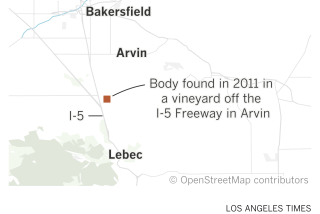Restoring a ‘Jane Doe’s’ identity
- Share via
TRENTON, N.J. — It was one of the most unusual cases to land on Lt. Eduardo Ojeda’s desk. A woman had been picked up wandering in a New Jersey mall, disoriented, unable to speak and carrying an empty purse.
Her fingerprints yielded no database hits. No one had reported her missing. With investigators unable to determine whether she was a U.S. citizen and eligible for Medicare, she was committed to a New Jersey psychiatric hospital instead of a nursing home.
She would remain there for 15 years, bedridden and suffering from Alzheimer’s disease, known only as “Jane Doe.”
Ojeda tried to learn her identity.
He rechecked the databases, made the rounds of foreign consulates, tried to piece together the bits of her name she had briefly uttered the one time she spoke. Every lead went cold.
“It was always on my mind. It really kind of bothered me,” Ojeda said. “As someone said: ‘You don’t find peace until you find all the pieces.’ ”
Ojeda, a police officer with the New Jersey Department of Human Services, decided to launch a public appeal after receiving a call last summer from the New Jersey courts, where the woman’s institutionalization was up for periodic review.
Tips flooded in: She had lived in Brooklyn for years, supporting her only daughter by working factory jobs.
She was the elderly woman frequently seen wandering around Woodbridge, ordering a cheeseburger and a cup of coffee at a fast-food restaurant nearly every day.
She was frequently spotted, well-dressed, her hair always nicely done, wandering outside a Woodbridge grocery store carrying two shopping bags full of clothes.
Tips also recently led Ojeda to the woman’s daughter, still living in Brooklyn, whose birth certificate revealed her mother’s full name and nationality.
The woman’s name is Elba Leonor Diaz Soccarras, 75.
With help from the Colombian Consulate in New York, investigators discovered that Diaz had emigrated legally in 1969 from the town of Villanueva, in the La Guajira region of Colombia, where she had grown up with six siblings.
Ojeda confirmed that she had worked in blouse and dress factories in New York City for several years but said it may never be known how she ended up in New Jersey or came to be abandoned at the mall.
Ojeda said those who had known Diaz described her as a humble, hard-working, churchgoing woman who “fell prey to this disease,” now an advanced case of Alzheimer’s.
The daughter, whom Ojeda declined to name, said they had a falling-out when the daughter was young and hadn’t spoken since.
The woman was shocked to hear about her mother because she had assumed that Diaz had returned to Colombia decades ago.
Now that Diaz’s identity and immigration status have been established, she has been approved for Supplemental Security Income assistance and Medicaid and is to be transferred to a nursing home, according to officials with the New Jersey Department of Human Services.
Ojeda, 52, said the resolution of the case has been bittersweet.
“Every person, no matter what, has the right to die with the dignity of a first and last name,” he said.
More to Read
Sign up for Essential California
The most important California stories and recommendations in your inbox every morning.
You may occasionally receive promotional content from the Los Angeles Times.













